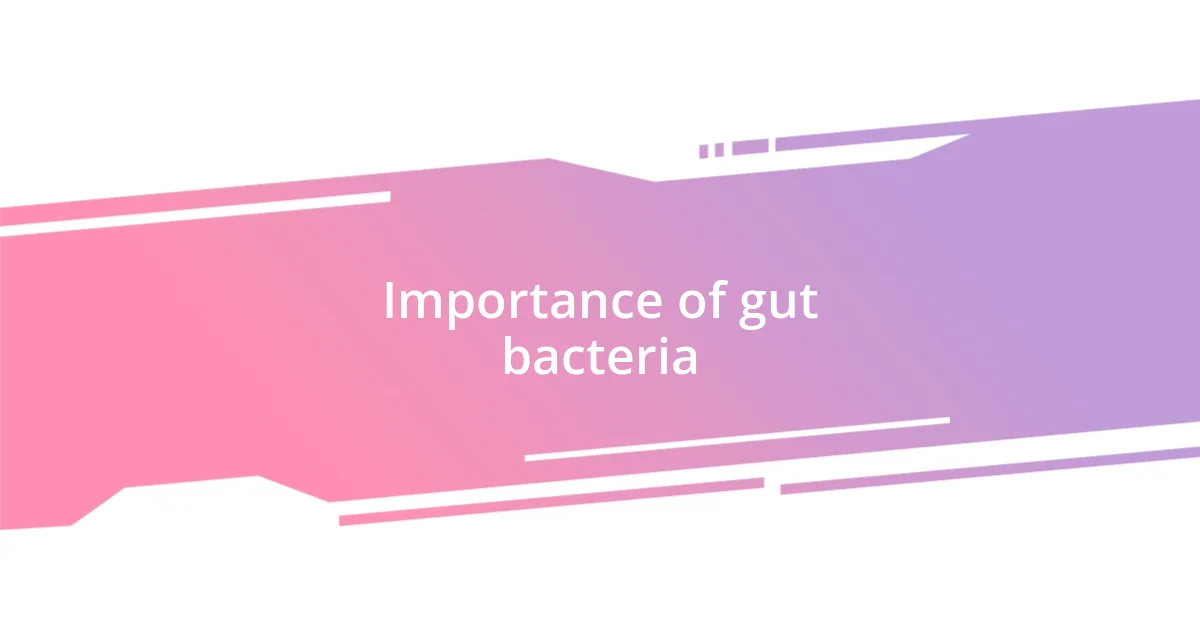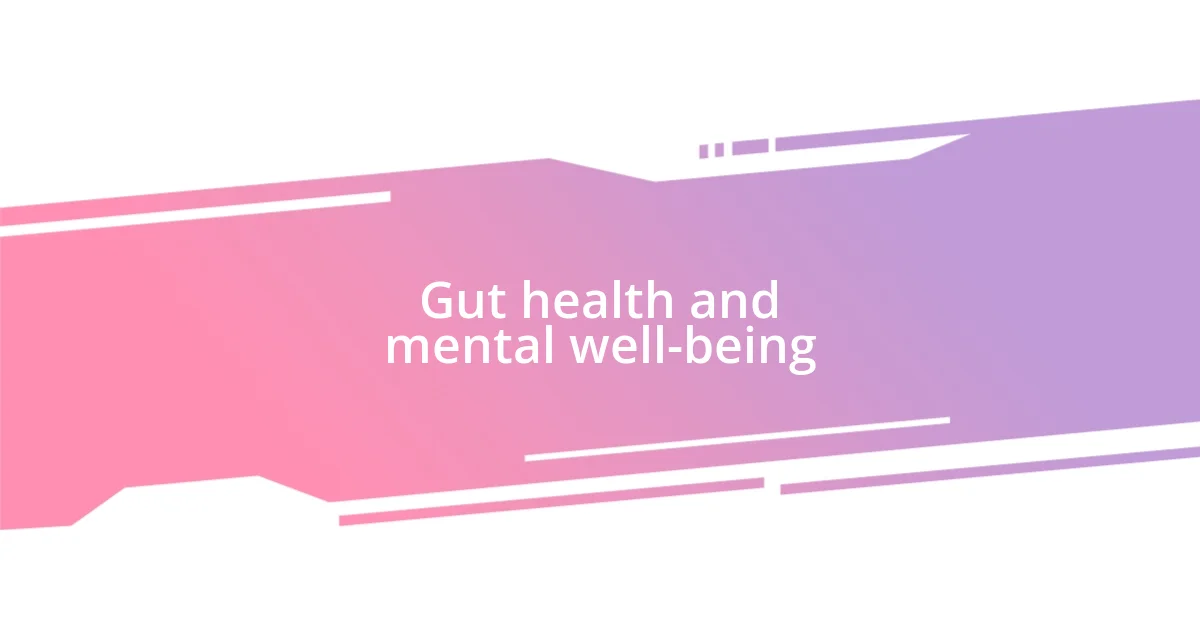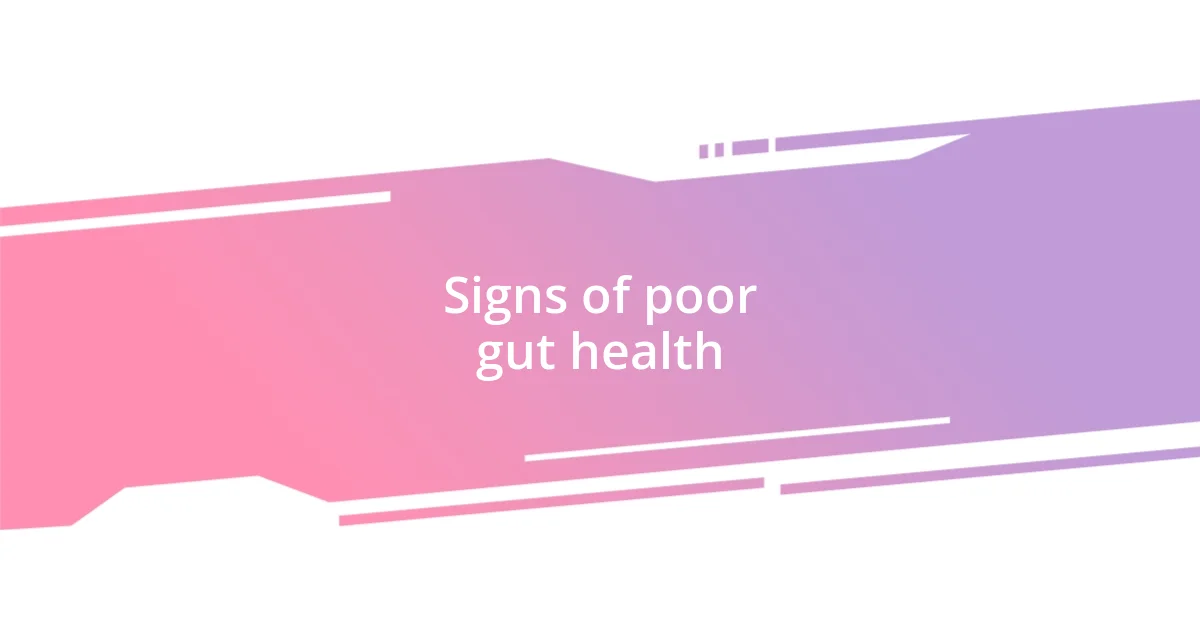Key takeaways:
- Gut health is vital for overall well-being, influenced by the balance of gut bacteria and diet.
- Dietary choices, particularly increased fiber and fermented foods, significantly enhance gut health and mood.
- Signs of poor gut health include fatigue, digestive discomfort, and skin issues, highlighting the gut-skin connection.

Understanding gut health basics
Gut health is often overlooked, but it plays a crucial role in our overall well-being. I remember a time when I felt constantly bloated and fatigued; it turns out my gut was crying out for attention. Have you ever considered how your diet might be impacting your digestive system?
At its core, gut health refers to the balance of bacteria in our digestive system, often called the gut microbiome. This balance influences everything from digestion to immunity. When I learned how certain foods can either nourish or harm the beneficial bacteria, it was a game-changer for me.
Understanding that stress also affects gut health was eye-opening. Have you felt how anxiety can manifest physically? I’ve found that practicing mindfulness not only calms my mind but also improves my digestion. It’s fascinating how our mental and physical health are intertwined, isn’t it?

Importance of gut bacteria
Gut bacteria play an essential role in maintaining our overall health. When I realized that this tiny ecosystem of microorganisms influences my immune system and mood, it truly changed my perspective on wellness. It’s astounding to think that the right balance of gut bacteria can help stave off illnesses and even affect how I feel on a daily basis.
Here are some key reasons why gut bacteria are so important:
- They aid in digestion and nutrient absorption.
- They synthesize vitamins, such as B12 and K.
- They regulate the immune response, helping to prevent infections.
- They communicate with the brain, influencing mental health.
- They help protect against harmful pathogens and maintain gut barrier integrity.
Having a diverse gut microbiome has made a tangible difference for me, especially when I started incorporating more fermented foods into my diet. I noticed a boost in my energy levels and a reduction in stomach discomfort. Understanding the importance of gut bacteria not only motivates me to prioritize gut health but also inspires others to take a closer look at their own wellness habits.

Impact of diet on gut health
Diet plays a pivotal role in shaping our gut health. I vividly remember experimenting with different foods and noticing how my body reacted. After incorporating more whole foods—like fruits, vegetables, and whole grains—I felt a significant improvement in my digestion. It’s remarkable how these nutrient-dense choices can enhance the diversity and health of the gut microbiome.
On the flip side, I’ve also noticed the adverse effects of a high-sugar and processed-food diet. During a busy period in my life, I relied on convenience foods, and it didn’t take long before I started feeling sluggish and bloated. This imbalance taught me just how detrimental such choices can be, not just for my gut but for my overall energy levels and mood.
In my journey toward better gut health, I’ve come to appreciate the importance of fiber. I still remember the first time I prioritized adding more legumes and leafy greens to my meals. My gut felt lighter and more balanced, reaffirming the critical connection between what I eat and how I feel daily.
| Type of Food | Impact on Gut Health |
|---|---|
| Whole Foods (Fruits, Vegetables) | Promote diversity of gut bacteria, improve digestion |
| Processed Foods (High-Sugar) | Can lead to imbalance and digestive issues |
| Fiber-Rich Foods (Legumes, Whole Grains) | Support healthy gut flora and enhance gut function |

Gut health and mental well-being
The connection between gut health and mental well-being is something I’ve come to understand profoundly. I recall a particularly stressful time in my life; my digestion struggled, and so did my mood. It made me wonder—could what was happening in my gut really influence how I felt mentally? Research does suggest that our gut bacteria communicate with our brain through the gut-brain axis, reinforcing the idea that nurturing my gut health could also nurture my mental health.
One day, I decided to dive deeper into probiotic-rich foods. As I enjoyed a creamy yogurt bowl topped with berries, I sensed a shift. It wasn’t just about the taste; I felt lighter, almost uplifted. That made me think: can something as simple as food provide the support my mind craved? Indeed, incorporating those good bacteria seemed to enhance my mood, showing me the powerful link between my wellbeing and what I put on my plate.
Experiencing fluctuations in mood has made me more mindful of my gut health. I now find solace in meditation and dietary choices, aiming for balance. It’s fascinating to see how these practices can influence one another. Have you considered how your own gut health might be affecting your emotional state? I encourage you to reflect on this connection—sometimes, addressing the gut could be the first step toward a more balanced mind.

Signs of poor gut health
When I experienced persistent fatigue and brain fog, I began to wonder if my gut health was at play. It felt like my mind was constantly clouded, making it tough to focus on anything meaningful. Looking back, I learned that gut issues can significantly impact energy levels and cognitive function—something that’s often overlooked.
Another sign of poor gut health that I encountered was unexpected digestive discomfort, like bloating and gas. It was uncomfortable, sure, but what struck me most was how frequently I felt that way after eating certain meals. Noticing this pattern made me rethink my food choices and highlighted the crucial role that a balanced diet has on overall gastrointestinal health. Have you ever felt that discomfort after a big meal? It’s a clear signal that something might be off in the gut.
Lastly, I realized that skin issues, such as breakouts or irritation, could also stem from an unhappy gut. I remember when acne flared up more than usual, and it coincided with a few weeks of indulgent eating. It made me ponder: could my gut health be spilling over into how my skin looked and felt? It turns out that the gut-skin connection is quite real, reinforcing the importance of maintaining a healthy microbiome for both internal and external wellness.

Strategies to improve gut health
One of the first strategies I embraced to improve my gut health involved adding more fiber-rich foods to my diet. I started incorporating lentils, quinoa, and various fruits and vegetables. Honestly, it felt like a simple adjustment with a noticeable impact. I remember the first time I felt truly nourished after a meal brimming with colorful produce—it was as if my gut was cheering me on. Have you ever noticed how fresh food can simply make you feel better?
Fermented foods soon became a staple in my kitchen, too. I started experimenting with sauerkraut, kimchi, and kombucha. The first sip of kombucha was a little surprising, but I soon relished the tangy taste and bubbly sensation. This adventure opened my eyes to the diversity of flavors while genuinely nurturing my gut. Isn’t it fascinating how a little creativity with our food choices can lead to such delicious health benefits?
Mindfulness played a crucial role in enhancing my gut health as well. I began to practice conscious eating, savoring each bite rather than rushing through meals. This practice helped me recognize when I was truly full, reducing overeating and discomfort. I’ll never forget one dinner where I paused and truly enjoyed the flavor of every morsel—what a game changer that was! Have you considered how taking the time to appreciate your food could improve digestion and overall well-being? It’s a small shift that can lead to significant rewards.














